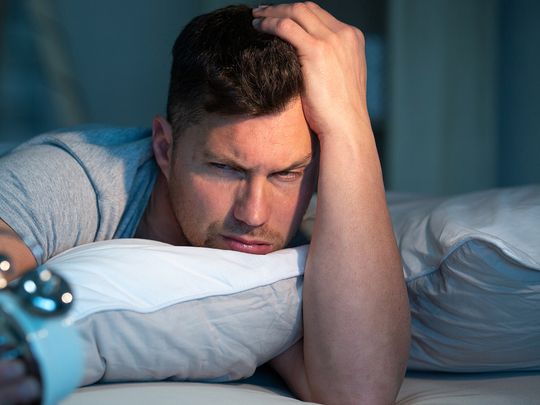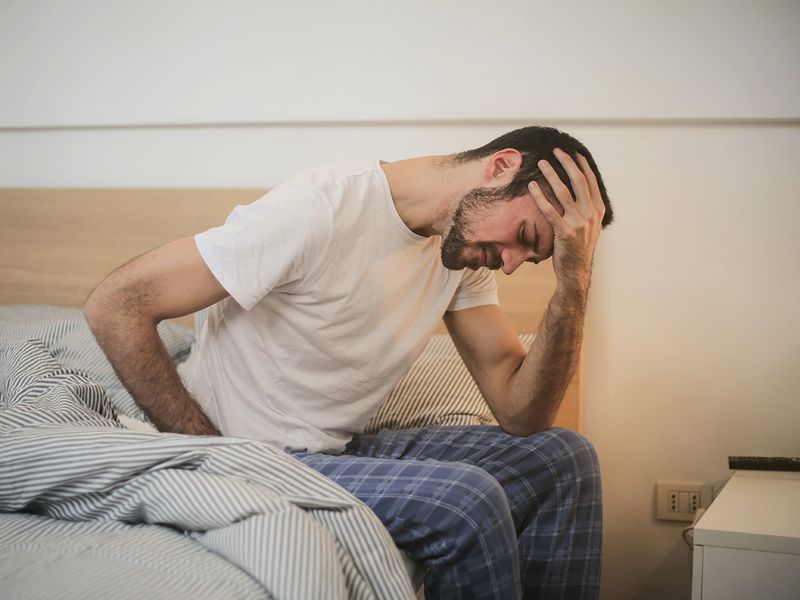
Everyone has those rough nights where they can’t sleep. Usually, stress is the main culprit.
While the conditions of sleeplessness and insomnia is said to be more prominent in women, the men do struggle with it too. There could be similar reasons for this, including chronic stress, anxiety, or life events that can knock them off their game.
The American Academy of Sleep Medicine and the Sleep Research Society had suggested that 7 to 9 hours of sleep are required for optimal health in adults. However, a 2012 survey showed that 29.2 per cent men surveyed for a study, achieved less than six hours of sleep on an average per night. The research undertaken traced the reasons to societal changes. These included the dependence on technology, longer work hours and poor hygiene. This creates havoc in the Circadian rhythms, which are the physical and mental changes that follow a 24-hour time cycle of day and night. It ruins the quality of sleep.
How sleeplessness affects men

While sleeplessness affects both men and women equally, it creates problems that are unique to men. Apart from decrease in testosterone, it also leads to urological problems as well as weight gain. “The urological conditions related to the prostate can also make men get up several times during the night. It also affects the quality of sleep," says Juliana Korth, specialist in internal medicine at the Dubai-based Zia Medical Center.

Men also suffer from sleep apnea, more than women, which is a common condition where your breathing stops and restarts many times while you sleep. This is dangerous, as it can prevent the intake of oxygen. Unhealthy sleep patterns can also contribute to inflammation, which impacts your heart health, which is a precursor to heart attacks, says Chris Miller, ahealth expert and the founder and director of Incre-Mental, a wellness platform.

The urological conditions related to the prostate can also make men get up several times during the night. It also affects the quality of sleep...
Moreover, as men get older, they are more likely to experience insomnia or the inability to sleep. The American organisation, National Sleep Foundation, reported that middle-aged and older men are more likely to have difficulty falling asleep and staying asleep than younger men. There could be a variety of reasons for this, including unhealthy lifestyle habits ranging from work stress, to daytime napping, and caffeine intake, says Korth. Anxiety, a new baby or other life events can also contribute to disrupting the sleep schedules.
How can men fix their sleep schedules to ensure their well-being?

Don’t underestimate the power of good sleep hygiene: It’s essential for your well-being. “The body needs to rest and regenerate,” says Korth. “A good sleep routine is crucial and should be a priority,” she says. Just taking sleep medicines is not a sign of ensuring well-being she emphasises. You need to take a few matters in your hands.
So if you’re having difficulty with sleep or battling insomnia, apart from professional help, here’s what you can do. First of all, you need to see what you can do that doesn’t involve pills or medication. Make sure you have a comfortable environment, explains Miller. There should be no signs of light that can disturb you. Put dark blinds. Put your phone on silent or flight mode, and try to sleep, he says. “The blue light in your phones and digital tablets activates your brain, making you restless.”

See what you can do that doesn't involve pills or medication. Make sure you have a comfortable environment. Put dark blinds, put your phones on silent or flight mode.
Avoid drinking coffee six hours before bed, he adds. If you have intense workout schedules in the evening, make sure that you complete any high intensity exercise around two hours before bed. If you had a restless night, try not to sleep in. As your digestion slows down when you sleep, eating a heavy meal like steaks can lead to an uncomfortable sleep as your stomach is full. Opt for white meat instead, and avoid food items that are high in saturated fat before you sleep.
You can also have a hot shower before bed. According to the American medical site, The Sleep Foundation, just before bedtime, our body temperature naturally cools, while skin temperatures of the hands and feet increase. Scientists state that immersing the body in warm water aids this natural temperature regulation process, improving sleep as a result.

Dean Henry, the founder of UAE Peptides and functional medicine coach, lists six hacks to battle sleeplessness and insomnia in men:
Supplementation: A variety of supplements can help sleep. For instance, regulating melatonin, a hormone governing the sleep-wake cycle, is a regular practice. A pineal peptide bioregulator can help recalibrate the body's internal clock, promoting timely sleep. Other supplements like GABA, 5-HTP, L-theanine, and magnesium can influence neurotransmitters, thereby inducing relaxation, increasing serotonin, which is a precursor to melatonin, and relaxing muscles. Natural remedies like lavender and chamomile can also promote sleep and relaxation. However, consult with a medical professional before using any supplements.
Sleep hygiene: It’s crucial to establish sensible sleep habits. Start the day by enjoying the natural morning light, which can help set the Circadian rhythm, as artificial blue light from screens can disrupt it. Limiting screen exposure, especially before bedtime, is recommended. For those who can't avoid screens, wearing blue light-blocking glasses after 7 pm may be beneficial. A sleep-conducive environment, free from electronic disturbances, is essential. This includes a dark room, with blackout blinds. You can try reading a calm book under soft lighting, which is a comforting ritual to follow before sleep.
How to deal with caffeine consumption: While many enjoy their hot morning coffee, it's advisable to delay caffeine intake until about ninety minutes to two hours after waking up. This allows the body to awaken naturally. Additionally, to ensure restful sleep, refrain from caffeine consumption after 2 pm. If late night caffeine enhances your sleep, it may indicate adrenal imbalance, warranting a caffeine detox.
Diet and digestion: It's recommended to avoid eating at least two hours before bedtime to give the digestive system some time to work. If you consume food close to bedtime, it can cause indigestion. If late meals are unavoidable, try sipping apple-cider vinegar diluted in water, or chewing gum can help in digestion.
The right kind of food: Include simple carbohydrates in the last meal of the day, which can prevent glucose dips in your sleep. Some food items, like cherries, kiwis, almonds, pistachios, and bananas, are believed to enhance sleep due to their nutrient compositions, which include melatonin-inducing compounds and minerals like magnesium and potassium.
Focus on your mental well-being: Address the root causes of your stress and anxiety, as it can affect your sleep. Work on your breathwork and meditation, as it can ensure better sleep.









